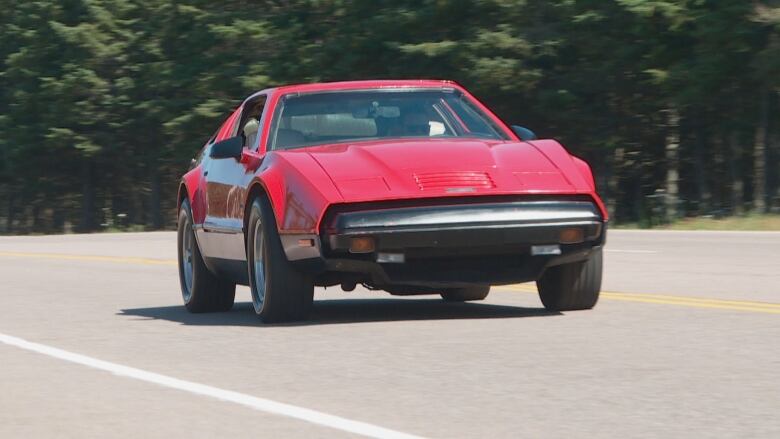Meet the sportscar made with safety in mind and a Maritime connection
1975 Bricklin SV-1 manufactured in Saint John, N.B.

The Car Life Museum in Bonshaw, P.E.I., is home to many cars with interesting stories behind them.
It is home to the first, and third car to cross the Confederation Bridge, as well as Elvis' own pink Cadillac.
While those cars have interesting stories, the museum recently added something new to its collection. And while its gull wing doors and wedge shape make the car look like it's capable of travelling through time with help of a flux capacitor, it isn't.
"Some people think that it's a Delorean when they see it. People just aren't sure," said Greg MacKay, owner of the Car Life Museum.

"We've had it on display out here all summer and people are asking a lot about it and what it is."
It's not a Delorean.
It's a 1975 Bricklin SV-1.
If you've never heard of the brand, there's good reason. MacKay said the car is one of about 1,000 Bricklins that are still on the road today.
It does have some unique features, the wedge shape, popup headlights and doors that open through a hydraulic system at the push of a button.
And inside, it's what's missing that is unique.
"You'll notice that there's no cigarette lighter or no ashtray in the car.… When Malcolm Bricklin made the car, he believed that smoking was a distraction and he didn't want a cigarette lighter or an ashtray in his car," said MacKay.
That's because SV-1, stands for Safety Vehicle 1.
With a welded roll cage to keep the driver safe and impact absorbing bumpers, it's designed to make safety look good.
The Maritime connection
Bricklins were manufactured in Saint John, N.B., after a deal between the creator, Malcolm Bricklin, and then former premier Richard Hatfield.
Bricklin wanted to build a safe production vehicle and Hatfield wanted to market the province as a progressive place to do business.
Initially, the province put forward $4.5 million to the venture, but that had ballooned to $23 million by 1975.

In that year, the company went into receivership. Fewer than 3,000 Bricklins ended up rolling off the line in Saint John.
MacKay said the cars were built for the American market.
"To my knowledge, you couldn't purchase them in Canada," said MacKay.
"They were made for export to the U.S. You have to go through a U.S. dealer in order to purchase them and bring them back to Canada."
The mystery
As to how this one ended up on P.E.I., MacKay said he's still working on figuring that out.
"I want to keep tracking down some history on the car, and I'd love to hear from any previous owners that may believe that this is their car. Definitely be interested for them to reach out to to us."
He said sometimes car histories can be difficult to find online, so part of the fun with this has been learning as people stop by.

"I find that it's a little difficult to actually know what's credible, what you read online on the car," he said.
"I have learned some things from people coming through the museum this summer that know the cars. And interestingly enough, people that know people or family that worked at the plant in Saint John."
He said he's heard stories about the cars being test driven through the city, even though they weren't road legal in Canada, by plant employees.
"The idea of it was to just drive them around the parking lot. But there was an error there with one of the employees at the plant and they were driving all over the city," he said.

"Again, that's just a tidbit that somebody had told me."
And while that may or may not be true, learning more and unravelling the mystery and folklore surrounding the car is part of the fun for MacKay.
He said he hopes people keep swinging by the museum to check out the Bricklin, and offer up stories if they're more familiar with the car than he is.